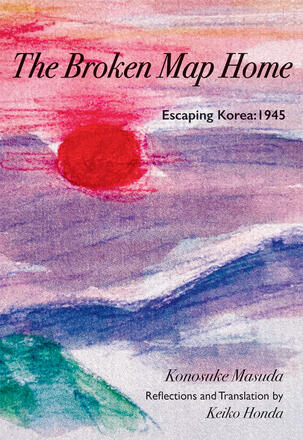From the Diary of Konosuke Masuda
A Tale of the 38th Parallel, A Narrow Escape from Death
Keiko Honda has translated this eye-witness account from the diary of her grandfather, a surviving Japanese conscript at the close of World War II. In a recent book launch of The Broken Map Home, she mentioned that in the present climate of nationalism and expansionist ambitions, she felt the time was right to translate the diary into English as a warning as well as a reminder of the humanity and hope we all share. The warning: people must remember or come to know the terrible outcome of war. The humanity and hope: the diarist recounts adventures with helpful people and even people whose hearts open at the plight of the stranded Japanese, especially the plight of women and children.
Boomers will remember parents and grandparents talking about Japanese soldiers entrenched in remote islands for years after World War II had ended. These stranded soldiers were unaware of the end of the war and apparently the Allies or what was left of the Japanese government had no plan to go and get them. The Broken Map Home has some similarities as Konosuke Masuda is conscripted in the final days of the war in North Korea where the Japanese had established a colonial foothold. As the war ends, these colonial Japanese suddenly find themselves in the position of the defeated with the Soviet army advancing on what had been Japanese Korea. Capture would mean imprisonment or death.
Masuda does fortunately discover that the war is over and that Japan has lost. His information comes via his commanding officer who could not overtly tell his men to desert, but who communicates as much to them and then deserts himself. At this point, everything more or less descends into chaos. We feel for Masuda as he is not sure where he is in relation to the 38th parallel and the safety of South Korea. He is without a map, a compass or our familiar necessities of a cell phone or GPS.
In the North are Masuda’s entire family, a grandmother, wife, and four children who are at great risk as the Russian Army advances. Masuda is aware of the severe danger that threatens his loved ones and we feel his frustration as he tries to find a way to get to them. The diary reveals how Masuda manages to save not only himself, but his entire family through his decisions and insightful reading of the various people he encounters along the way.
The story is gripping and fascinating. We are in luck that the diary was saved and that Honda translated it. In addition, Honda comments and gives explanations that enrich the translation.Keiko Honda was born in Japan and raised by her grandmother and grandfather, the diarist. She has written two recently published memoirs, Accidental Blooms and Hidden Flowers. These writings deal with her immigration to New York City as a young Japanese wife to a North American and the ensuing years as an epidemiologist at Columbia University until a debilitating auto-immune system illness. This resulted in her moving to Vancouver, B.C., Canada where her former husband had family and where she is now the founder and CEO of the Vancouver Arts Colloquium.
—Mary Stewart Kean
* * *

